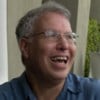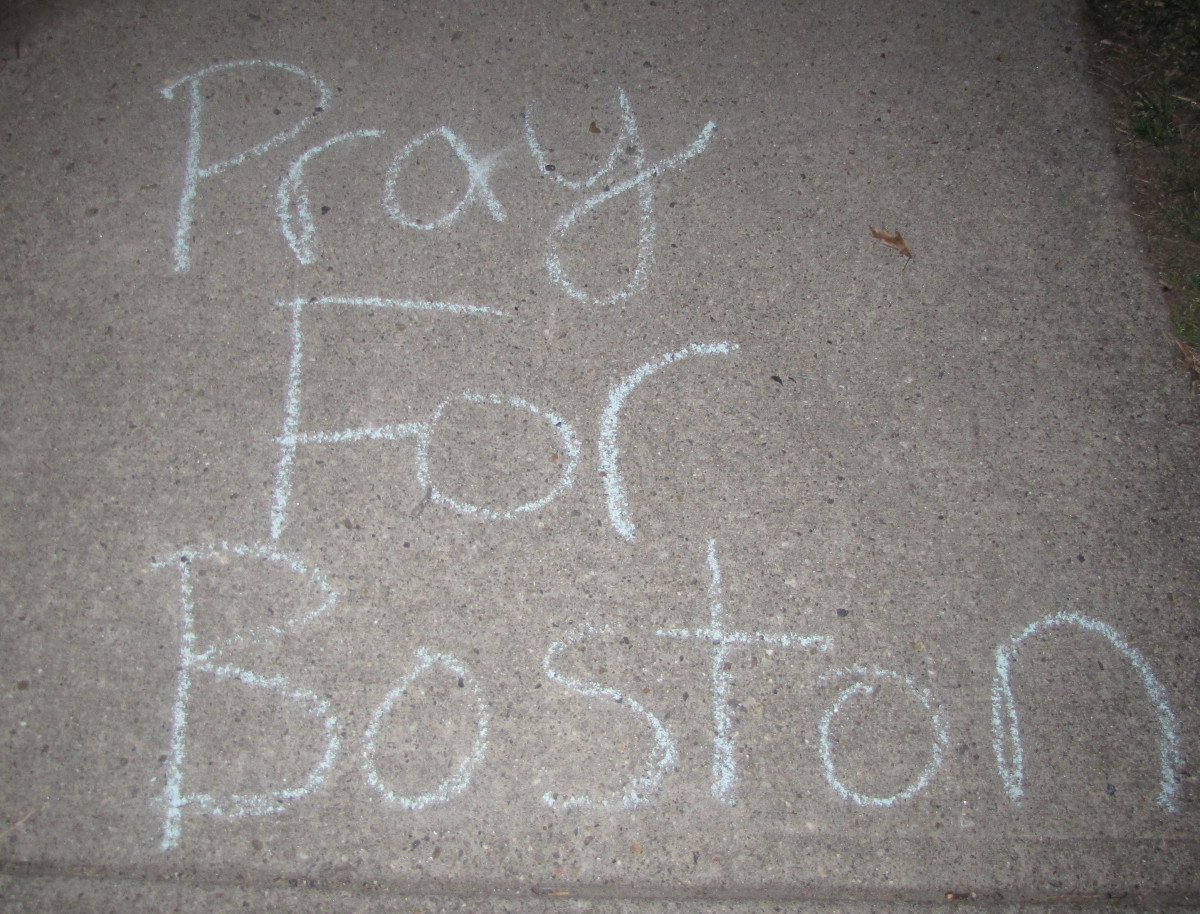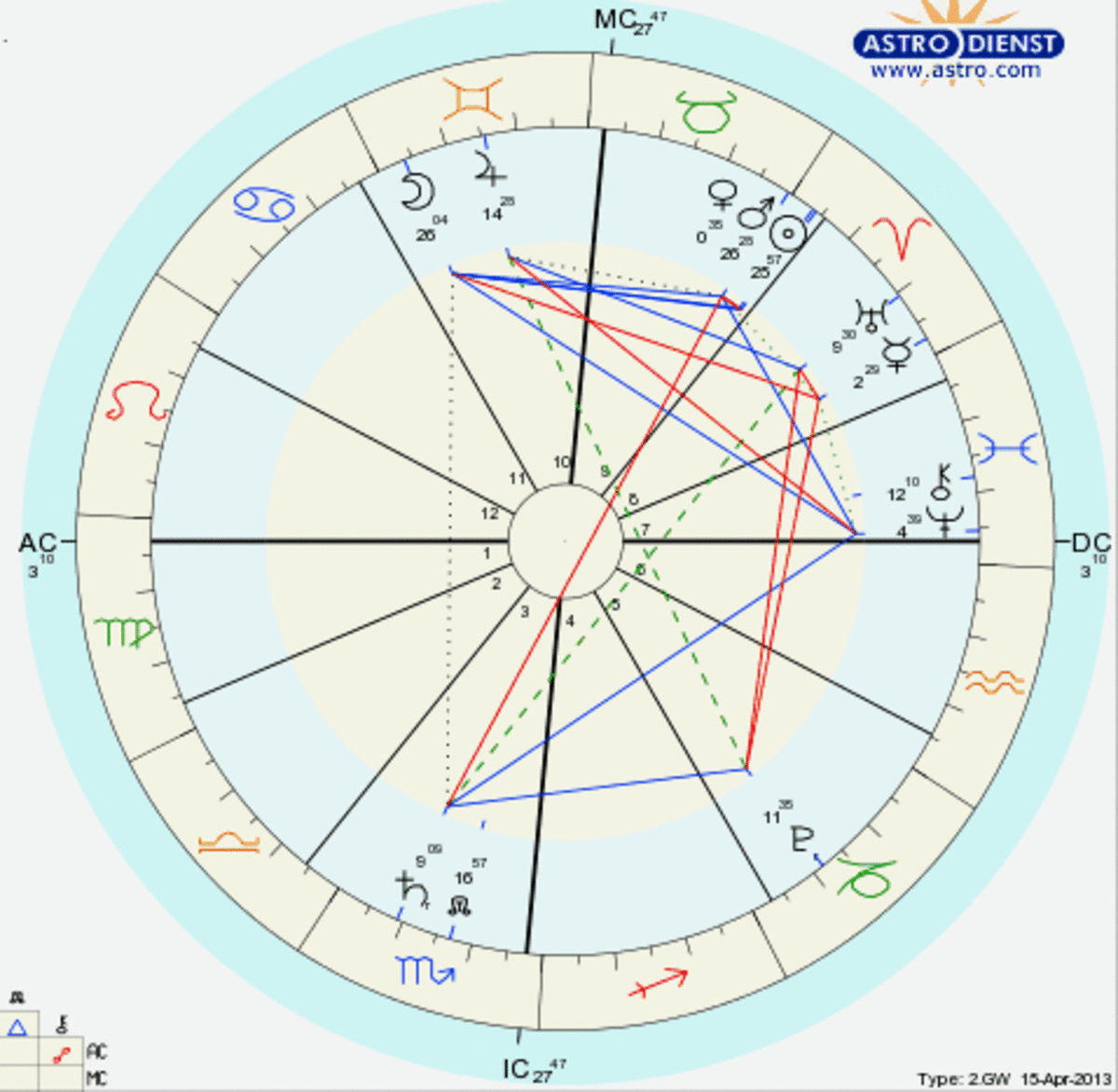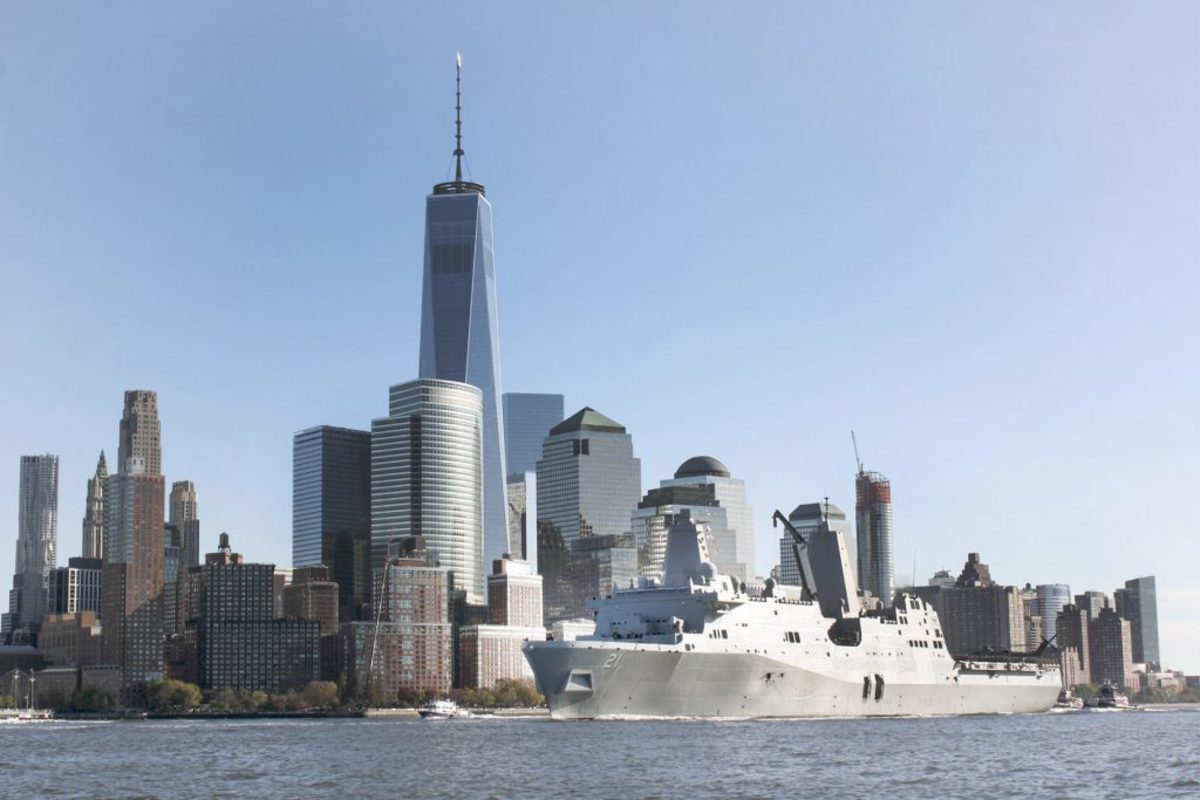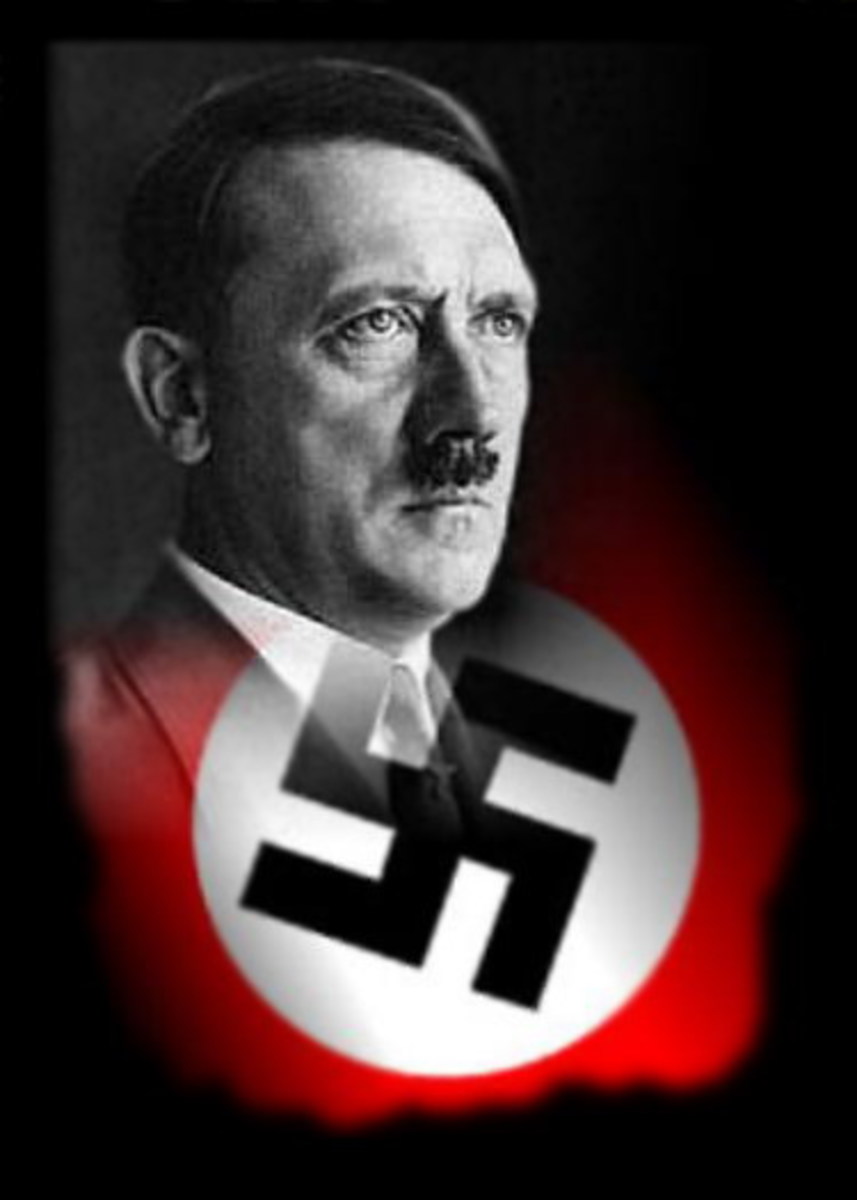Terrorist Attacks: The Cost of Living in a Free Society
The Boston Massacre (1770)
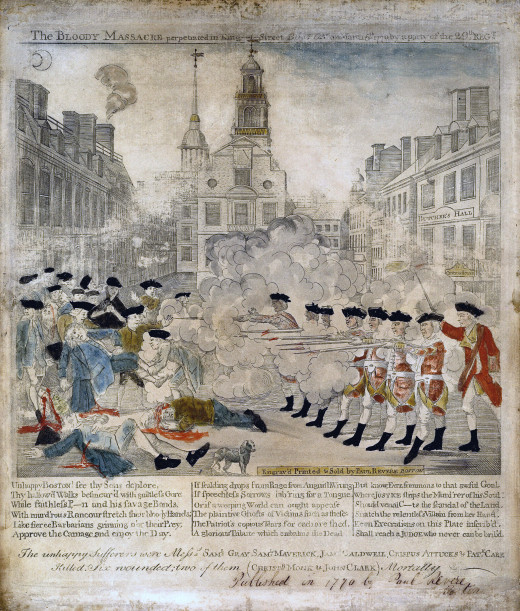
A Free Society is Vulnerable
It is a sad fact of our world that a few people want to express a political or religious agenda with terrifying acts of violence.
In an odd way, it is a wonderful fact that, in the United States, they can do it.
We could give up our freedoms: The right to assembly; the right of nearly unrestricted travel; the right not to be searched unreasonably; the many rights related to privacy. And if we did, we would have a safer society. The very freedom that let's us carry backpacks without having them checked and drive cars that can't be searched without reasonable cause lets bombers drop a bomb off in a crowd and let's crazed shooters bring automatic weapons to a school or a movie theater.
Terrorist attacks, spree killings, and serial killings all have different motives. But all are possible because we can gather to watch a marathon or a ball game, place private phone calls, and buy and keep guns, ammunition, and the parts for bombs.
Using the Boston Marathon bombings of April 15, 2013 and other events of 2012 and 2013, I will explore issues around our freedoms and the price we pay for freedom in the 21st century.
The Boston Marathon Bombings: Grief and Tragedy
My heart goes out to those who lost their lives, and the families of those who died, in the Boston Marathon bombings on April 15, 2013. And it goes out equally to the over 250 people who were injured or crippled in the bombing.
I have a hope for the injured, especially those who lost feet or legs. I hope that they find the strength to heal, even to the point of running or rolling in a Boston Marathon within a few years. May we all find strength after tragedy. And may those of us who were blessed by not being injured reach out to support the suffering.
Much ink will be spilled over this event. None of it should hide the grief or slow down the healing from this tragedy.
Boston Marathon Bombing
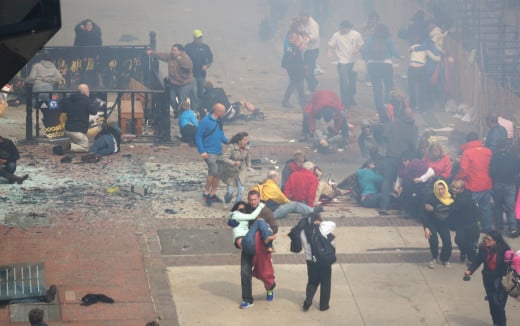
Many Mixed Feelings About Police Activity
Many people have expressed mixed feelings about the intense police manhunt after the bombings. I want to say that, overall, I think an excellent job was done. The speed and accuracy of the FBI in identifying likely bombing suspects, confirming them with a survivor, and getting the word out was excellent. The fact that both suspects are no longer free in less than 5 days is excellent. Let's compare this to other bombings and spree killings where the terrorists did not die or surrender at the scene:
- No one was apprehended for the Centennial Olympic Park Bombing during the Summer Olympics in 1996. The terrorist, Eric Rudolph, went on to commit three more bombings before he was caught.
- The Beltway Sniper Attacks in October 2002 in the Washington DC - Baltimore area went on for three weeks and included 13 separate shooting incidents and ten fatalities, and that was after the terrorists, John Allen Muhammad and Lee Boyd Malvo probably shot people all the way across the country.
I feel called to write this article because of an article on www.AlterNet.org called "How Absurd: 8 Crazy Reactions, Ridiculous Conclusions, and Dumb Media Behavior Coming out of the Boston Bombings." I agree with some points in that article. But I do not think that the manhunt in Boston or the lockdown of the city were over-reactions.
I think they are signs of freedom at work.
And, sad as this may sound, I think that the fact that the bombing - a tragedy - occurred at all is another sign that we are still living in a free nation.
Historical Perspective: Boston Massacre to Boston Marathon Bombings
Back in 1770, the British Government was taxing citizens without representation, was housing troops in people's homes and on their farms by force, was searching homes and seizing property without any legal procedure. This government repression led to the Boston Massacre, where unarmed citizens threw rocks at armed soldiers, and four of the soldiers fired back, killing one citizen.
John Adams, who later went on to define the fundamental freedoms from government oppressiion in the US Constitution, was a lawyer in defense of the soldiers. He won his case, and the soldiers were not punished for defending themselves with deadly force.
So, clearly, John Adams believes that the government can control belligerent crowds and other dangerous situations with deadly force.
Fast forward 244 years to 2013. Terrorists kill three civilians and one police officer, and one of them dies. They also wound over 250 people (and back in 1770, many, perhaps most of those, would have died. In response, the Boston Police request that people stay in their homes. I think that John Adams would agree with me that Steven Rosenfeld, the author of "How Absurd", was wrong to compare the lockdown of Boston by police to wrongful acts by the British colonial government in Boston that led to the revolutionary way.
Was the Lockdown of Boston Constitutional?
Some people argue that the lockdown of Boston violated citizen's rights. But it is very hard to make a case for this. Police did not enter anyone's home without permission. Police did not impose a curfew or arrest anyone for going outside or gathering. So the police did not violate any citizen's Fourth Amendment right "to be secure in their persons, houses," nor anyone's First Amendment right of assembly. The lockdown was a request from the government and police, not a police action, and certainly not an action of a police state.
Was the Lockdown of Boston a Good Choice?
In 1977, my high school was shut down while terrorists held hostages in the B'nai B'rith headquarters next door. (They took hostages at the Islamic Center of Washington and the District Building - city hall - at the same time.) A SWAT team literally took over our high school. So I know what it is like to be around terrorism and the defense against it.
I lived in Washington, DC and Baltimore for many years, and I was staying with my mother, who was ill, nearby in Philadelphia during the three weeks of terror of the Beltway Sniper Attacks.
I can tell you that I would have preferred a 4-day lockdown to 3 weeks of uncertainty with unknown snipers driving around the city. That's for sure.
Also, the lockdown wasn't a full lockdown. Citizens were asked to stay in their homes. No one was ordered to, and no one was arrested for breaking a curfew. Many events were cancelled. Many, but not all.
And it worked. The clear communication and careful house-to-house searches trapped the remaining suspect where the police thought he was - in Watertown.
20/20 Hindsight is Unfair
There is another point to be made. Many people, including Steven Rosenfeld, the author of "How Absurd" are writing with 20-20 hindsight. We now know that there were only two people actively involved in the bombings. We now know that they had a load of pipe bombs that they dumped when they were chased. They also had two friends who covered up their activities and hid firecrackers that could have been used to make another bomb, and another friend who lied to the police to protect them.
During the manhunt, police had no way of knowing that only two assailants were directly involved. They had no way of knowing that the terrorists had not already planned to attack other locations. They had no way of knowing that the terrorists didn't have collaborators who would hide them or help them escape.
So a statement like the manhunt "shut down an entire city to cate one 19-year-old on the run" (Steven Rosenfeld, in "How Absurd" on Alter.net) are 20/20 hindsight, Monday-morning quarterbacking, and downright ridiculous, in my view.
We must consider the facts of terrorism: Terrorists often work in teams and select multiple targets close to one another. What if there had been three teams of two men (or women) each? What if the Celtics basketball team or the Bruins hockey game had also been a target? Cancelling events (voluntarily, not by police order, by the way) was a sensible thing to do.
Why "unprecedented" action?
Many people criticize the massive Federal and police action, and the lockdown of Cambridge and Watertown as "unprecedented." And they were unprecedented. But is that a bad thing? Or, maybe, is it a very, very good thing?
In my view, up until now, the police have not done enough when a spree killer, serial killer, or terrorist is on the loose. We haven't locked down cities. We haven't brought in massive police support. And killers have been allowed to go on killing.
Back in 2002, such a strong response to John Allen Muhammad's murders in Louisiana and Alabama, in which three were killed, would have prevented him from killing ten more people the next month in the Beltway Sniper Attack. In 1996, a successful manhunt after the Centennial Olympic Park bombing would have prevented the killer, Eric Robert Rudolph, from planting three more bombs and killing a police officer in the next two years.
Letting killers run free to keep killing is called failure. Police methods in fatal terrorist attacks where the suspect does not die or surrender at the scene have been failures up until now.
When we have failed in the past, it is time to change what we do. It's time for unprecedented action.
The immediate, massive police response to the Boston Marathon bombings was unprecedented, indeed. It was an unprecedented success.
I hope such effective police work becomes a precedent. Whenever we can't prevent a terrorist attack, I hope we can catch the offenders before they kill again.
Freedom or Terror: An Alternate View
Back in the 1980s, my father-in-law, a professor of theology at Yale University, shared this story about a colleague. The colleague was a Russian Orthodox priest originally from the Soviet Union, who was then sent to Canada to care for a parish of Russian Orthodox who had immigrated to Canada. This priest lived through the worst years of Soviet repression of the Russian Orthodox Church, which included horrific stories of torture of his brother priests.
Even so, as my father-in-law reported, this man did not want to stay in Canada. He wanted to return to the Soviet Union. Why? He found the violence and sexual openness of Canadian society (much less violent than the US, then or now) far more threatening than the oppressive government that tortured his brother priests.
The lesson: Each person, and each nation, must decide the balance between the risk of terror and torture by a repressive government vs. the risk of terrorism, spree killings, and the like from its own citizens and residents.
Have We Lost Our Freedom?
Personally, I am very concerned about the reduction in freedom that may come with the Patriot Act. It could be misused.
But I disagree with those who say we have already lost our freedom. I think that the Boston Marathon Bombings are a very sad consequence of living in a free (and imperfect) society.
We Live in a Free Society
Five dead (including the three victims, one police officer, and one of the terrorists) over 15 critically wounded, and wounded 250 wounded: This is a high price to pay for our freedom.
But that is exactly what it is, the price of freedom.
Why do I say this?
I believe that, if we did not live in a free society, the Boston Marathon bombings would not have happened. How so? In a society that was not free, Tamerlan Tsarnaev, after being questioned by the FBI in 2011, could not have gone to Russia in 2012, or, if he had, he would not have been allowed to come back in to the United States. If the Patriot Act were being over-used, Tamerlan Tsarnaev would have been closely watched or under arrest. But he wasn't.
A society that is not free has many ways of protecting itself against terrorists, spree killers, and serial killers. For example, on the same day that about 20 children were killed in Newtown, CT by a madman, another madman attacked elementary school students in a school in rural China. In China, citizens are not allowed to own guns, and there is a military guard at the school. The attacker in China injured 20 children before he was subdued, but killed no one.
In contrast, in the US, we allow citizens to own guns and the military cannot act on US soil.
A society committed to the freedom of its citizens has many fewer ways to prevent terrorism, spree killings, and serial killers. Our freedom to live as we want makes it much easier for people who turn to violence to kill when they want.
Freedom and Terrorism
Is it harder to control terrorism in a free society?
Some Specifics
A society that allows people to travel to foreign countries allows us to attend terrorist indoctrination or training camps. A society that allows people to gather together creates targets for terrorists to attack. A society that allows individuals to buy guns and ammunition allows them to make gunpowder-based bombs and haul around enough firepower to enter into an hours-long firefight with the police.
Freedom is the opportunity to do what we want to do. Unfortunately some of us (US citizens like Dzhokhar Tsarnaev, and naturalized residents like his older brother Tamerlan) want to perform terrorist acts and kill other people.
Until human nature changes, it seems like living free means living with terrorism.
Alternate Views on Freedom and Terror
Is Prejudice Involved?
Tamerlan Tsarnaev was Muslim, but he was not an Arab. His native language was not Arabic, and he was from Chechnya and Russia and other Russian republics, which are not Arab states. Also, his skin is very white, as he comes from north of the Caucasus mountains for which all Caucasians are named. (Most Arabic people are Caucasian, but darker-skinned, and our stereotypes see Arabs as having darker skin.)
My wife asked me if someone who was suspected like Tamerlan but who was Arab might have been put on a no-fly list. It's a good question. Certainly, people we had less reason to suspect than Tamerlan were put on the Federal no-fly list in the first few years after the destruction of the World Trade Center. I don't think so: The FBI description of Tamerlan contained all the keywords of concern, such as "radicalized," "increasingly puritanical religious tone," "Islamist certainty," and "extremist." And the area he travelled to in 2012 is described on Wikipedia as "an area of separatist movements, ethnic rivalries, extremist Islamic ideology, and a 'hotbed' of militant Islamic activity."
That Tamerlan, a man who's own uncle described as "being radicalized," was allowed to make this trip and return without being put under very close scrutiny is a sign of the freedom of our society.
Tamerlan Tsarnaev: Trip to Russia in 2012
Dagestan, in the North Caucasus Mountains, where Tamerlan was born, and where he visited again in 2012.
Tamerlan also visited Chechnya in 2012, and his father is Chechen.
Freedom, or Stupidity?
Don't get me wrong. There's another view here. Maybe the FBI should not have been so lenient or lax. It concerns me that the Russian government called us and warned us, basically, "this guy might well be, or become, a terrorist," and then the FBI got on the case, questioned Tamerlan, and let it happen anyway.
I sincerely hope that the FBI is re-examining its methods for tracking potential terrorists. I want to live in a free society safer than what we just saw in Boston.
But I am willing to pay the price of freedom, and pray and work for peace in an increasingly violent world.
Clearly, an act like the Boston Marathon bombings will bring up many strong feelings and opinions. I welcome your opinions, and I'd like to see them in the comments section below. I will approve anything that is respectful, not prejudiced against anyone, and not insulting or harmful to the survivors of the attack.
Survival and Hope
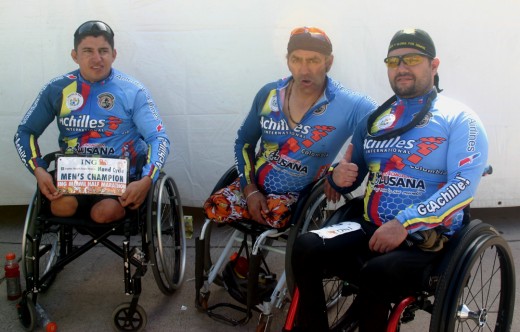
Freedom, Vigilance, and Compassion
I posted a question here on HubPages comparing the Boston Marathon bombings and the explosion of a fertilizer plant in West Texas. The number of dead and injured were very close; one was a terrorist attack, the other was due to negligence and/or accident. Several of the people who responded pointed out that it is more important to focus on care for the survivors and the families of the dead than it is to focus on the drama of the events. I agree. Others pointed out that terrorism is caused not only by the harmful intent of the terrorist, but also by negligence - or at least ineffective action - by the people responsible for preventing these attacks.
I hope we preserve our freedom. I was very nervous about the Patriot Act, and I'm still concerned. But what I've seen so far shows that our freedom is still intact, at a very high cost.
As we move beyond the recent tragedies, I hope - and I will work to see - that we are more diligent in preventing these violent and unnecessary deaths and more compassionate in helping survivors and their families thrive as part of our free society.
